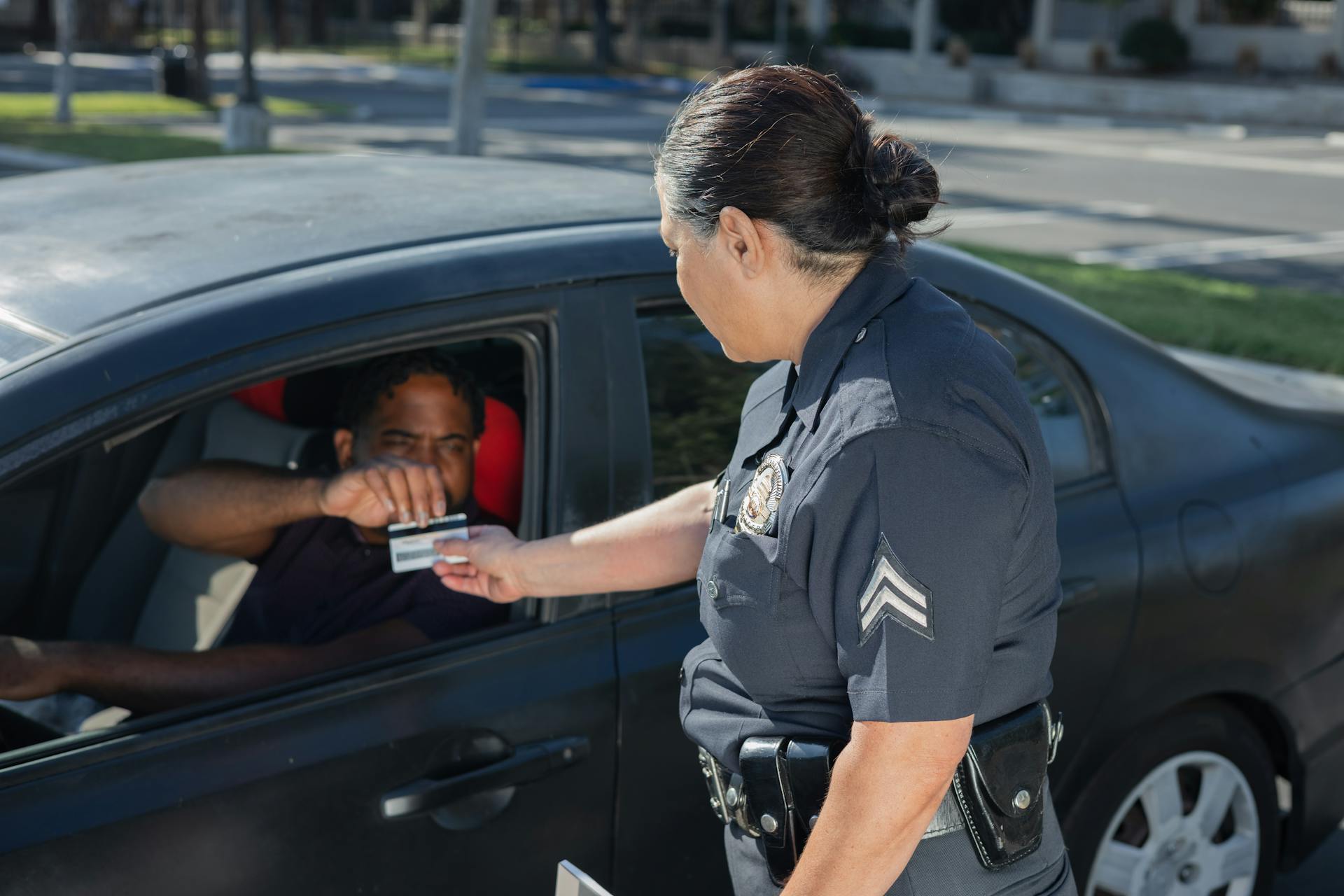
The cost of becoming a licensed life insurance agent varies significantly from state to state. In California, for instance, the license fee is $60, plus a $30 fingerprinting fee.
To give you a better idea of what to expect, let's take a look at the costs in some other states. In Florida, the license fee is $50, while in Texas, it's $50 as well.
In New York, the license fee is $52.50, and you'll also need to pay for a background check, which costs around $15.
For more insights, see: Claims Adjuster Licensing Requirements by State
License Cost Overview
The cost of obtaining a life insurance agent license can vary depending on the state you're in. In most cases, you can expect to pay between $300 and $1,000.
Prelicensing education is a necessary step before taking the licensing exam, and the cost of these courses can range from $150 to $300. This fee can be paid online or in person, depending on the provider.
The licensing exam fee itself can cost anywhere from $40 to $150, depending on your state. Some states, like California, may also charge a convenience fee of around $33.
After passing the exam, you'll need to apply for your insurance license, which will set you back anywhere from $20 to $200 for state fees. Most states require you to apply through the National Insurance Producer Registry (NIPR), which has its own transaction fees.
Some states also require a background check and fingerprinting, which can cost between $25 to $60. These costs are just the beginning, as you'll also need to consider ongoing expenses for continuing education, license renewals, and insurance coverage.
Here's a breakdown of typical insurance license costs:
- Prelicensing education: $150-$300
- Licensing exam fee: $40-$150
- Licensing application fee: $20-$200
- Background check and fingerprinting fee: $25-$60
Keep in mind that these costs can vary depending on your state and the type of license you're applying for. It's essential to research the specific requirements and fees for your area to get an accurate estimate.
State-Specific Fees
Insurance license fees vary significantly from state to state. For example, Arizona has a licensing fee of $120, plus a fingerprint processing fee of $22.
Some states have specific requirements for business insurance, such as Errors and Omissions insurance (E&O insurance). For instance, Arizona recommends E&O insurance, while Minnesota requires it.
Here's a breakdown of licensing fees for some states: StateLicensing FeeArizona$120Arkansas$50Kansas$15Minnesota$50Mississippi$100
These fees can add up quickly, so it's essential to factor them into your business plan.
Intriguing read: Average Book of Business Insurance Agent
Alabama
If you're an insurance agent looking to get licensed in Alabama, you'll need to meet the state's requirements. Be at least 18 years old.
The Alabama Department of Insurance is the regulatory agency overseeing the licensing process. You'll need to pass a licensing exam, which is administered by the University of Alabama.
The license fee in Alabama is $80. This is a one-time fee that covers the cost of processing your application.
To operate a business in Alabama, you'll need to consider a few insurance requirements. If you have five or more employees, you'll need to carry workers' compensation insurance.
Here are the minimum insurance requirements for commercial auto in Alabama: $25,000 per person, $50,000 per accident, and $25,000 property damage.
For your interest: Florida Claims Adjuster
Arizona

Arizona has specific requirements for insurance licenses, including passing a licensing examination and being at least 18 years old.
The licensing fee in Arizona is $120, plus a fingerprint processing fee of $22. This is a total of $142.
If you're an insurance producer in Arizona, you're not required to have specific business insurance, but Errors and Omissions insurance (E&O insurance) is often recommended.
Intriguing read: Arizona Department of Insurance Agent Search
Arkansas
If you're looking to get licensed as an insurance agent in Arkansas, you'll need to meet a few requirements. Be at least 18 years old.
To get started, you'll need to pass a licensing examination, which is administered by PSI. This is a standard step in the process.
A fingerprint and background check are also required, which is standard procedure in many states.
The license fee in Arkansas is $50, a relatively low cost compared to other states.
If you're planning to start a business, you'll want to consider Errors and Omissions insurance (E&O insurance), which is often recommended. This type of insurance can help protect you in case of any mistakes or oversights.
If you have three or more employees, you'll also need to obtain workers' compensation insurance, which is required by law in Arkansas.
If you plan to sell commercial auto insurance, be aware that Arkansas requires a minimum of $25,000 per person, $50,000 per accident, and $25,000 property damage coverage.
Additional reading: Insurance Agent License Reciprocity States
California

California has a licensing fee of $188 for insurance agents, which is administered by PSI. This fee is required to become a licensed producer in the state.
To become licensed, you'll need to complete 32 hours of prelicense education, including 12 hours of ethics training. This is a requirement for most insurance lines, but if you're applying for combined licenses, you'll need to complete 52 hours.
The California Department of Insurance requires a fingerprint and background check as part of the licensing process.
Here's a quick rundown of the minimum requirements for commercial auto insurance in California: $15,000 per person, $30,000 per accident, and $5,000 property damage.
Errors and Omissions insurance (E&O insurance) is often recommended for producers in California, but it's not a specific business insurance requirement. If you have employees, you'll also need to have workers' compensation insurance.
North Dakota
In North Dakota, the insurance license fee is a flat rate of $100, which is administered by PSI. This is a one-time fee that covers the licensing process.
If you're planning to become an insurance agent in North Dakota, you'll need to pay this fee as part of the licensing process.
See what others are reading: How to Become a Life Insurance Agent in Nc
Delaware

Delaware has a specific fee for insurance agent licenses, which is $100. This fee is non-negotiable and is required to obtain the license.
The Delaware Department of Insurance is the regulatory agency responsible for overseeing the licensing process. They work to ensure that insurance agents in the state are properly trained and qualified.
To become licensed, you'll need to pass an exam administered by Pearson Vue, which is Delaware's designated exam administrator.
Curious to learn more? Check out: Insurance Agent License Exam
Florida
In Florida, you'll need to pay a $50 license fee, plus an additional $5 per line of authority.
The state requires a fingerprint and background check, which is a standard procedure for many professionals.
If you're planning to work with specific types of insurance, you'll need to complete prelicense education courses, which can vary in length.
Here's a breakdown of the prelicensing course hours required for different lines in Florida:
Florida requires a minimum of $10,000 per person / $20,000 per accident / $10,000 property damage for commercial auto insurance.
Hawaii

Hawaii requires a license to work as an insurance agent, which can be obtained through the Hawaii Insurance Division. The licensing process involves taking an exam administered by Pearson Vue, and the license fees vary but are typically around $150.
To become a licensed insurance agent in Hawaii, you'll need to familiarize yourself with the state's specific requirements. Hawaii does not have a mandatory business insurance requirement for producers, but Errors and Omissions insurance (E&O insurance) is often recommended.
If you plan to hire employees, you'll need to obtain workers' compensation insurance, which is a Hawaii state requirement. This is a crucial step to ensure you're following the law and protecting your employees.
Hawaii has specific minimum requirements for commercial auto insurance, which include $20,000 per person, $40,000 per accident, and $10,000 property damage coverage.
Take a look at this: How to Become a Licensed Insurance Agent in Washington State
Iowa
In Iowa, you can obtain an insurance agent license by meeting certain requirements.
To get started, you'll need to pass a licensing examination, which is administered by Pearson Vue. The license fee is a straightforward $50.

To be eligible for the license, you must be at least 18 years old and provide proof of eligibility to work in the U.S. if you're a non-citizen.
You'll also need to demonstrate five years of employment history without any gaps in your license application.
Here's a quick rundown of the Iowa insurance license requirements:
- Be at least 18 years old
- Pass a licensing examination
- Proof of eligibility to work in the U.S. (non-citizens)
- Five years of employment history in license application without date gaps.
As for insurance requirements, Iowa doesn't mandate specific business insurance for producers, but Errors and Omissions insurance (E&O insurance) is often recommended.
Kansas
In Kansas, you'll need to pay a license fee of $15 to become an insurance agent. This is a relatively low fee compared to other states.
The Kansas Insurance Department requires a fingerprinting fee of $60, which is an additional cost you'll need to consider.
If you're planning to start a business in Kansas, you'll need to have Errors and Omissions insurance, also known as E&O insurance, which is often recommended for producers.
If your business has a gross annual payroll of more than $20,000, you'll need to have workers' compensation insurance. This is a requirement for all non-agricultural businesses in Kansas.
Here are the minimum requirements for commercial auto insurance in Kansas:
- $20,000 per person
- $40,000 per accident
- $15,000 property damage
Kentucky

Kentucky has a licensing fee of $40, plus an additional $40 fee per line of authority. This fee is in addition to the $50 exam fee.
To become a licensed insurance agent in Kentucky, you'll need to complete 20 hours of prelicensing training for each major line of authority. This training is a requirement for taking the state-administered licensing exam.
The exam fee in Kentucky is $50, and exams are administered at various government offices, community colleges, and technical schools. These locations are convenient for those looking to become licensed.
If you're planning to hire employees, you'll need to obtain workers' compensation insurance in Kentucky. This is a requirement for businesses with one or more employees.
Here are the minimum requirements for commercial auto insurance in Kentucky: $25,000 per person, $50,000 per accident, and $25,000 for property damage.
Broaden your view: How to Become a Licensed Insurance Agent in Kentucky
State-Specific Fees
State-specific fees can vary significantly from one state to another.
In Minnesota, the license fee is $50, plus a $10 technology fee, making it a total of $60. An additional $50 is charged per line of authority.

The total cost can add up quickly, so it's essential to factor this into your business plan.
In Nebraska, the license fee is a flat $50, which is a relatively straightforward cost to budget for.
It's worth noting that these fees are subject to change, so it's always a good idea to check with the regulatory agency for the most up-to-date information.
Here's a breakdown of the fees for both states:
Mississippi
If you're planning to become an insurance agent in Mississippi, you'll need to meet the state's requirements, which include completing 20 hours of prelicensing education for each line of authority you request.
The license fee in Mississippi is $100, plus a $1 online application fee.
To get started, you'll need to take the exam administered by Pearson Vue.
Mississippi requires Errors and Omissions insurance (E&O insurance) for producers, which is often recommended.
If you have five or more employees, you'll need to obtain workers' compensation insurance in Mississippi.
The minimum commercial auto insurance requirements in Mississippi are $25,000 per person, $50,000 per accident, and $25,000 property damage.
Missouri

Missouri has a relatively straightforward approach to insurance licensing. The license fee is $100.
To become a licensed insurance agent in Missouri, you'll need to pass a state exam administered by Pearson Vue. There are no required prelicensing courses, which can be a relief for those looking to get started quickly.
If you're planning to start a business in Missouri, you'll need to consider Errors and Omissions insurance (E&O insurance), although it's not required by law.
Missouri requires workers' compensation insurance if you have five or more employees, which is a crucial consideration for business owners.
Here are some key insurance requirements for commercial vehicles in Missouri:
- Minimum liability coverage: $25,000 per person / $50,000 per accident / $25,000 property damage
New Hampshire
New Hampshire has a relatively straightforward insurance licensing process.
The New Hampshire Insurance Department regulates insurance agent licenses.
You won't need to complete prelicensing education if you're a residential producer.
The exam service provider in New Hampshire is Prometric.
The license fee in New Hampshire is $210.
New Mexico

New Mexico has specific requirements for insurance agents. The license fee is $30, and the exam is administered by PSI.
To become licensed in New Mexico, you'll need to take the PSI exam. This is a standard requirement for all insurance agents in the state.
New Mexico also recommends Errors and Omissions insurance (E&O insurance) for producers. This type of insurance is often necessary for professionals who work with clients.
If you have three or more employees, New Mexico requires workers' compensation insurance. This is a standard requirement for businesses with a certain number of employees.
New Mexico's minimum requirements for commercial auto insurance are $25,000 per person, $50,000 per accident, and $10,000 for property damage. These are the minimums you'll need to meet to stay compliant.
Worth a look: Business Loans for Insurance Agents
North Carolina
North Carolina has a licensing fee of $82, which includes a fingerprint fee. This fee is a one-time payment required for all applicants.
The exam service provider in North Carolina is Pearson Vue, which administers the licensing exams for insurance agents. This is a requirement for obtaining a license in the state.
To become licensed, you'll need to pay an additional $50 per line of authority. This fee is in addition to the initial licensing fee.
Here's a breakdown of the fees associated with obtaining a North Carolina insurance agent license:
Oklahoma

In Oklahoma, the insurance agent license fee is $60, a relatively affordable cost compared to other states. This fee is administered by PSI, the same organization that oversees the licensing exam.
Oklahoma requires insurance agents to pass a licensing exam, which is also administered by PSI. This ensures that agents have the necessary knowledge and skills to provide excellent service to their clients.
If you're planning to become an insurance agent in Oklahoma, be prepared to pay the $60 license fee. This fee is non-negotiable and must be paid in order to obtain your license.
Curious to learn more? Check out: Oklahoma Insurance Agent Lookup
Oregon
If you're looking to get licensed as an insurance agent in Oregon, be prepared to pay a $75 license fee. This fee is administered by PSI, who also handles the exam.
The Oregon Division of Financial Regulation is the regulatory agency overseeing the insurance license requirements in the state.
Pennsylvania
In Pennsylvania, you'll need to complete 24 credit hours of approved prelicensing courses before sitting for your license examination.
The prelicensing education requirements include a minimum of 3 hours of approved ethics course.
The license fee in Pennsylvania is $55.
PSI administers the exam.
South Dakota

South Dakota has a relatively straightforward insurance license process. The regulatory agency overseeing this process is the South Dakota Division of Insurance.
To obtain an insurance license in South Dakota, you'll need to pass an exam, which is administered by Person Vue. This exam service provider is used to assess your knowledge and skills in the insurance industry.
The license fee in South Dakota is a flat $25, making it a relatively affordable option for those looking to enter the field. This fee is a one-time payment that covers the cost of processing your license application.
There are no prelicensing course requirements to fulfill in South Dakota, giving you more flexibility in how you prepare for the exam.
Tennessee
Tennessee has a license fee of $50 for insurance agents.
The Tennessee Department of Commerce & Insurance regulates the insurance industry.
You'll need to pass a Title insurance line of authority exam administered by Person Vue.
In Tennessee, there are no prelicensing course requirements to fulfill.
Broaden your view: How to Become an Insurance Agent in Tennessee
West Virginia

West Virginia has a straightforward insurance agent license process. The regulatory agency overseeing this process is the West Virginia Offices of the Insurance Commissioner.
To obtain a license, you'll need to pass an exam administered by Pearson Vue, the state's designated exam administrator. The license fee in West Virginia is a flat $50.
Related reading: Virginia Health Insurance Agent
License Acquisition Process
The license acquisition process can take anywhere from two to eight weeks, depending on your pace. This timeframe is largely spent on completing pre-licensing coursework and studying for the state licensure exam.
You'll need to finish your pre-licensing coursework, which is a huge chunk of the time spent on getting your insurance agent license. This coursework will help you prepare for the state licensure exam.
Once you get your insurance license, you're required to take a minimum of 24 hours of continuing education (CE) credits during a two-year term to keep your skills updated. These CE credits include three hours of ethics training.
The two to eight week timeframe can vary depending on your individual circumstances and pace.
A unique perspective: Can an Insurance Agent Work for Two Different Agencies
Sources
- https://www.insurance.ca.gov/0200-industry/0045-lic-fees/
- https://www.nextinsurance.com/blog/insurance-agent-license/
- https://myfloridacfo.com/division/agents/licensing/agents-and-adjusters/fees
- https://www.insurancebusinessmag.com/us/guides/how-to-get-an-insurance-agent-license-a-stepbystep-guide-472822.aspx
- https://www.insurance.ca.gov/0200-industry/0130-mailing-lists/fees.cfm
Featured Images: pexels.com